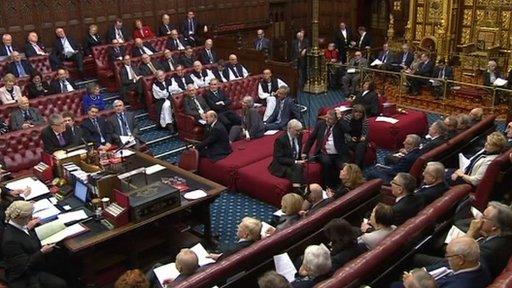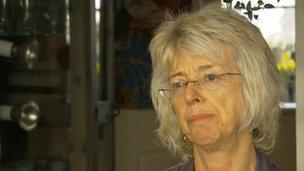Survey shows East Midlands under-represented in Lords
- Published
- comments

Just 2% of peers who attend 50% of sittings in the Lords are from the East Midlands
The four-and-a-half million people of the East Midlands can be a pretty raucous and noisy lot.
But in Parliament's second chamber, there's an almost deafening silence. And that's probably because a new survey reveals the region's voice is going unheard in the House of Lords.
The East Midlands has fewer noble lords and baronesses than any other part of the UK. Now there are calls for that under-representation to be addressed.
It was Oscar Wilde who wrote the House of Lords is never in touch with public opinion. He added: "That's what makes it such a civilised body."
'Biggest share' from London
A new report suggests Parliament's unelected second chamber is also out of touch with many of the regions of the country, especially the East Midlands.

Baroness Lister of Burtonsett said she was perplexed by the lack of representation
Out of the 432 working peers who attend 50% of sittings, only nine are from the East Midlands.
At 2%, that's the lowest representation of any part of the UK.
That's compared with 4% for the West Midlands and Yorkshire; 11% for the East and 20% from the South East.
At 24%, peers living in greater London make up the biggest share. The findings have been compiled for the House of Lords library.
So who is in the Lords with links with the East Midlands?
There's the Bishop of Leicester, the Right Reverend Tim Stevens and Lord Charlie Faulkner of Thoroton, near Newark, a former Lord Chancellor in the Tony Blair government.
Recent members include Tina Stowell, Baroness Stowell of Beeston, a former BBC Head of Communications who is now a government environment minister.
Attempts at reform
Also appointed in 2011, Nottingham-based Ruth Lister, Baroness Lister of Burtonsett. She's also a professor of Social Policy at the University of Loughborough.
She's perplexed by the East Midlands' lack of representation.
"It does surprise me that there are so few peers from the East Midlands compared to other regions and I can't think of any sensible explanation for that," she told me.
Unlike MPs or MEPs, members of the Lords have no direct constituency to represent.
"We're scrutinising legislation and bringing our experience of where we live and what we know is going on.
"But if a particular region is under-represented, it means the people who can bring that knowledge just aren't there. It needs to be looked at, but there's no quick fix," she added.
For the past 100 years, many governments have attempted to reform the second chamber.
The last attempt was two years ago; but the idea then, to introduce direct elections, also ended in failure.
Would that surprise Oscar Wilde? Perhaps not.